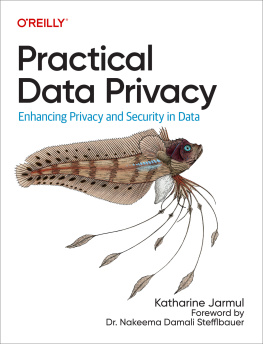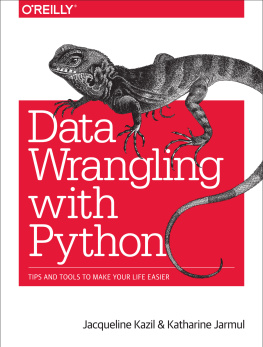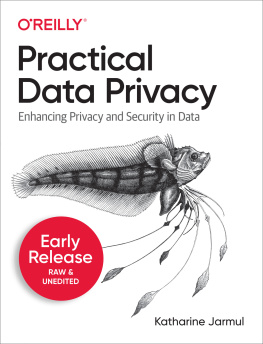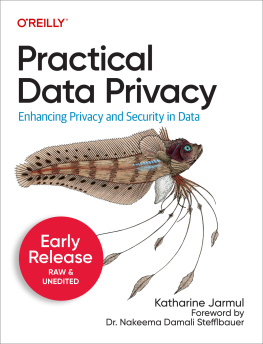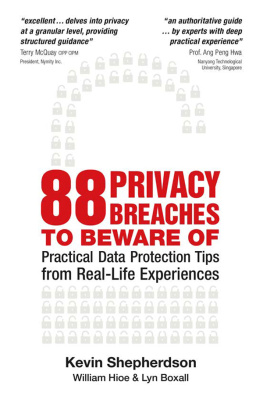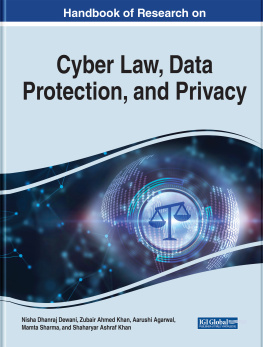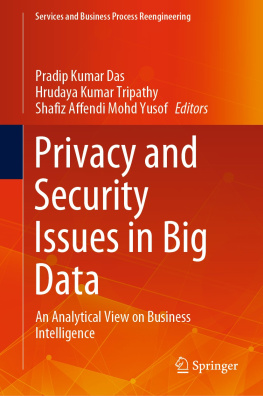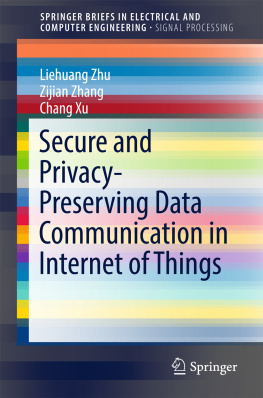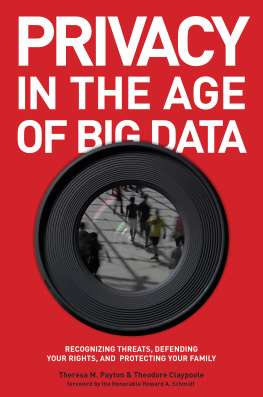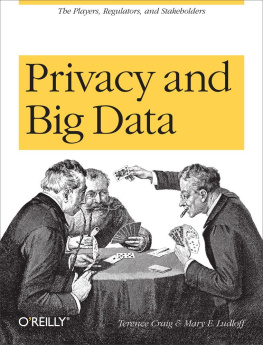Praise for Practical Data Privacy
Practical Data Privacy is exactly what it claims to bea practical exploration of the approaches to data privacy. The book carefully balances, and makes the case for, the business benefits of protecting our users data.
Rebecca Parsons, Chief Technology Officer, Thoughtworks
Finally, a book on practical privacy for some of the most important actors of data protection in practice: data scientists and engineers! From pseudonymization to differential privacy all the way to data provenance, Practical Data Privacy introduces fundamental concepts in clear terms, with examples and code snippets, giving data practitioners the information they need to start thinking about how to implement privacy in practice, using the tools at their disposal.
Damien Desfontaines, Staff Scientist, Tumult Labs
Gone are the days of saying data is the new oil; if data and oil have kinship today, it is that both are at risk to leak and make a huge, expensive mess for you and your stakeholders. The data landscape is increasing in complexity year over year. Regulatory pressures for data privacy and data sovereignty, not to mention algorithmic transparency, explainability, and fairness, are emerging worldwide. Its harder than ever to smartly manage data. Yet the tools for addressing these challenges are also better than ever, and this book is one of those tools. Katharines practical, pragmatic, and wide-reaching treatment of data privacy is exactly the treatise needed for the challenges of the 2020s and beyond. She balances a deep technical perspective with plain-language overviews of the latest technology approaches and architectures. This book has something for everyone, from the CDO to the data analyst and everyone in between.
Emily F. Gorcenski, Principal Data Scientist,
Data & AI Service Line Lead, Thoughtworks
Consumer privacy protection will define the next decade of internet technology platforms. Jarmul has written the definitive book on this topic, capturing a decade of learnings on building privacy-first systems.
Clarence Chio, CTO, Unit21 and coauthor of
Machine Learning and Security (OReilly)
Some data scientists see privacy as something that gets in their way. If youre not one of them, if you believe privacy is morally and commercially desirable, if you appreciate the rigor and wonder in engineering privacy, if you want to understand the state of the art of the field, then Katharine Jarmuls book is for you.
Chris Ford, Head of Technology, Thoughtworks Spain
I finally have a book to point people to when they avoid the topic of data privacy.
Vincent Warmerdam, Creator of Calm Code;
Machine Learning Engineer, Explosion
Practical Data Privacy lives totally up to its promisesit is very practical! You will learn a lot about privacy in the context of machine learning with examples from big companies and many packages that will help you solve typical problems. I learned a lot while reading this book and recommend it to people who are working with data.
Natalie Beyer, Cofounder, LAVRIO.solutions
Practical Data Privacy
by Katharine Jarmul
Copyright 2023 Kjamistan, Inc. All rights reserved.
Printed in the United States of America.
Published by OReilly Media, Inc. , 1005 Gravenstein Highway North, Sebastopol, CA 95472.
OReilly books may be purchased for educational, business, or sales promotional use. Online editions are also available for most titles (http://oreilly.com). For more information, contact our corporate/institutional sales department: 800-998-9938 or corporate@oreilly.com.
Acquisitions Editor: Andy Kwan | Indexer: WordCo Indexing Services, Inc. |
Development Editor: Rita Fernando | Interior Designer: David Futato |
Production Editor: Kristen Brown | Cover Designer: Karen Montgomery |
Copyeditor: Kim Wimpsett | Illustrator: Kate Dullea |
Proofreader: Piper Editorial Consulting, LLC |
- April 2023: First Edition
Revision History for the First Edition
- 2023-04-19: First Release
See http://oreilly.com/catalog/errata.csp?isbn=9781098129460 for release details.
The OReilly logo is a registered trademark of OReilly Media, Inc. Practical Data Privacy, the cover image, and related trade dress are trademarks of OReilly Media, Inc.
The views expressed in this work are those of the author and do not represent the publishers views. While the publisher and the author have used good faith efforts to ensure that the information and instructions contained in this work are accurate, the publisher and the author disclaim all responsibility for errors or omissions, including without limitation responsibility for damages resulting from the use of or reliance on this work. Use of the information and instructions contained in this work is at your own risk. If any code samples or other technology this work contains or describes is subject to open source licenses or the intellectual property rights of others, it is your responsibility to ensure that your use thereof complies with such licenses and/or rights.
978-1-098-12946-0
[LSI]
Foreword
Given the multitude of benefits that come with digital connectivity, it is not always apparent that waves of futuristic tech have also brought an undertow of drawbacks. Instant messaging, biometric scanning, real-time motion-tracking, digital payments, and more, were, after all, the stuff of sci-fi fantasies.
For those of us who work in technology (or just consume it), the cool factor of integrating digital tools into our daily routines is difficult to deny. But the other side of digitally connected living is the right to unplug. To hear some first-generation tech millionaires tell it, preventing their kids from going online at home and at school is highly desirable. That may sound strange, especially if youre used to hearing about the digital divide as a chasm between people with multiple Apple products versus have-nots who lack 24/7 high-speed internet. In fact, with so many of our everyday interactions having gone digital, its a challenge for most of us to function without unlimited online access.
Using digital tools and accessing online spaces is sold to us today the same way it was at the dawn of the internet: as a drop-in experience thats completely voluntary and fun. But nothing is fun about an internet experience that feels like a stay at the Hotel Californiayou can check out any time you want, but you can never leave. Nothing is fair about an online world that restricts your offline life in terms of what you can see, what you can do, and how you might be treated. The idea that we are choosing to drop in on the internet world for a casual set of interactions is no longer true: if anything, were often obliged to navigate a highway jam-packed with data about ourselves and others.
Many of us incorrectly assume that our data is uninteresting to anyone else. But thats when we dont see the full picture of how todays apps and algorithms hoard our data to connect where we live, what we earn, who we date, and whether weve had mental health problems or a sexually transmitted infection. Thats when we dont realize that the predictive function of algorithms is usually used to profile us using data that weve willingly and also unknowingly provided, so as to sell us (or prevent us from accessing) financial products, insurance coverage, jobs, homes, or potential romantic partners.

